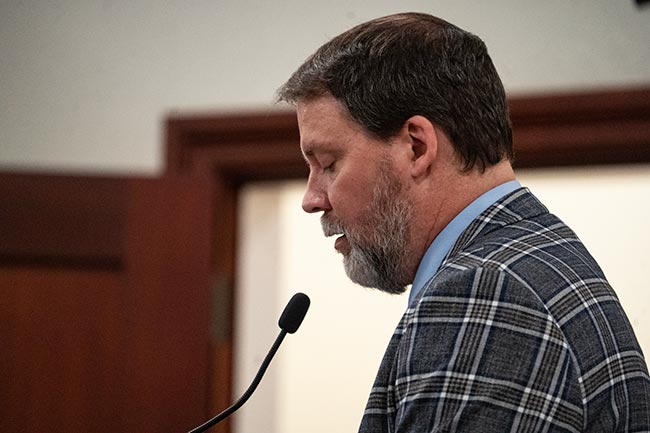City Council hears tenant preference policy proposal, budget update

The Claremont City Council honored the Claremont Stars boys 2012 soccer club Tuesday for winning the SOCAL State Cup Elite Cup championship. The team includes coach Cle Kooiman, assistant coach Chris Terrell, Tayton Hafif, Sam Corning, Carter Torres, Emilio Ocampo, Chase Alvarado, Andrew Casillas, Axel Rincon, Derek Chung, Ryan Scranton, Max Miramontes, Jaxon Phillips, and Nixon Terrell. Not pictured is Matthew Totri. Courier photo/Andrew Alonzo
By Andrew Alonzo | aalonzo@claremont-courier.com
After some ceremonial matters and the adoption of the consent calendar, Tuesday’s Claremont City Council meeting dove straight into two heavy topics: local tenant preference policy and Claremont’s upcoming priorities budget.
Tenant preference policy
The first item on the docket was consideration of a local tenant preference policy, which City Attorney Alisha Patterson explained was a local policy that requires a certain percentage of affordable rental units be made available first to city applicants who meet certain criteria — for example, those who live or work in the city or whose children go to school here — before the general public.
Patterson used examples of cities larger than Claremont which have housing divisions to explain what the policies are and do during a staff presentation.
While such a policy could reduce displacement of existing lower income residents and mitigate impacts of gentrification, it also faces unique challenges. Among them are staffing costs, implementation and enforcement resources, and if not structured properly, it could inadvertently promote segregation or result in unintended discrimination.

Claremont Finance Director Jeremy Starkey delivers the 2024-2026 budget process update at Tuesday’s City Council meeting. Courier photo/Andrew Alonzo
A local policy can be built from scratch with some caveats, and/or derive from parameters outlined in California Senate Bill 649, which went into effect in January 2023. The bill supports local tenant preferences for lower income households subject to displacement risk for two affordable housing developments that receive two specific kinds of funding: low-income housing tax credits administered by the U.S. Department of Housing and Urban Development, and certain kinds of tax exempt bonds. Affordable units required by a city’s inclusionary housing ordinance, for sale units, accessory dwelling units, and affordable units provided for a density bonus or builder’s remedy are not covered.
Patterson said the city has about 378 built and occupied units that could be subject to S.B. 649, including 47 within two projects that are approved but not yet built, and 132 in two projects with pending applications. The city has not yet reached out to the housing providers to confirm if the units would fall under S.B. 649.
Any potential local tenant preference policy would be required to further fair housing and comply with fair housing laws, and not have unintended discriminatory impacts on protected groups. The city would also have to file annual reports with the California Department of Housing and Community Development as part of its yearly housing element progress report.
Patterson said if city staff explores the policy further, it should be mindful of six key questions: should the policy align with S.B. 649?; should the policy apply to pipeline, entitled and/or existing projects?; should the policy include a “neighborhood preference?”; what factors should be considered when determining eligible applicants?; should staff conduct outreach to other cities with such policies and other stakeholders before ordinance development?; and should the city manager add more staff positions to develop, implement, administer and enforce the policy?
Council member Ed Reece asked if Claremont would need its own housing department to implement the projected policy. City Manager Adam Pirrie said no, but it would need at least one dedicated, new full-time city employee to oversee it.
If staff takes the policy forward, Claremont would likely have to hire an outside expert to conduct a disparate impact analysis, which would cost $30,000 to $50,000. The final policy must be legally defensible should it be challenged in court, Patterson said, and the city should be prepared to answer the question, “Will the policy make it harder for applicants in protected groups to obtain affordable housing?”
“If the answer to that question is ‘yes,’ then there’s a problem with your policy,” Patterson said. “It could be that after an expert looks at it, they could say ‘Just based on your demographics, there’s no way in your city to adopt a policy like this without having a disparate impact.’ But we’re not going to know the answer to that question until we have an expert who looks at the proposed policy.”

Sergeant Nick Martinez demonstrates a new piece of Claremont Police Department equipment, LifeVacs, an anti-choking device, at Tuesday’s City Council meeting. Courier photo/Andrew Alonzo
Council member Jed Leano expressed skepticism with building a policy if the disparate impact analysis could prevent its adoption.
“Wouldn’t it be the worst and most inefficient use of our resources to engage in a several years process to find out after the analysis that demographically we can’t do it, because no matter how we slice it, we violate the fair housing rights of protected classes?” Leano asked.
He then asked if it was possible to engage in the analysis question with a menu of different applicant criteria. Patterson said yes, but it would cost more.
“If there’s criteria that you like, what the disparate impact expert might be able to do is look at, okay, you like these criteria … if you use these criteria you can only apply them to x percent of your affordable units; if you go higher than that that’s when you’re going to be having a disparate impact,” Patterson explained.
While supportive of the idea, Mayor pro tem Corey Calaycay said based on past experience, projects need to take shape first before sinking additional staff time and money into new policy.
“Right now I prefer that we consider what we already have on the table regarding housing and not take on something this large at this point in time,” Calaycay said. “We have other things that are already on the priority list and then we’re adding new things that are very involved and we haven’t even finished other things that are on there.”
The council agreed to postpone the item for future consideration pending further research.
2024-2026 budget process update
Finance Director Jeremy Starkey presented the 2024-2026 budget process update, which highlighted funding related to the seven recently ratified 2024-2026 objectives: preserving the city’s natural, cultural and historic resources; maintaining financial stability; investing in the maintenance and improvement of local infrastructure; ensuring safety through community-based policing and emergency preparedness; increasing neighborhood livability and expanding business opportunities; promoting community engagement through transparency and communication; and developing anti-racist and anti-discrimination policies and a plan to achieve community and organizational diversity, equity and inclusion.
A preliminary funding breakdown of the 2024-2026 priorities and each of its subtasks is available at ci.claremont.ca.us/government, search “May 14 agenda,” and see item eight.
Monies for most priorities will come from the general fund, which preliminary estimates indicate will see a 14% increase in 2024-2025, from its current $31.6 million to about $36 million. The projected growth will be fueled by a 86.41% increase in license and permit fees; a 48.7% jump in property fees; a 27.16% increase in service charges; a 23% jump in business license taxes; and a 13.22% upswing in sales tax. The general fund projection for 2025-2026 is a more modest 1.76% increase to $36.6 million.
Also of note, the city is planning for a 10.8% increase to the 2024-2025 preliminary budget. The 2023-2024 adopted budget of $59.9 million is set to go to $66.4 million for 2024-2025, then decrease slightly to $66.1 million in 2025-2026.
Consent calendar
The council also unanimously approved the following consent calendar items:
- City warrant registers dated April 25 for $2,251,596.55 and May 9, $1,497,391.71, and the minutes from its April 23 meetings.
- A resolution approving a 2024-2025 engineer’s report by Willdan Financial Services as filed, “declaring its intention to levy and collect assessments within landscape and lighting district no. Ll001 for the fiscal year 2024-25 pursuant to the landscape and lighting act of 1972 for the maintenance and servicing of lighting and landscaping,” the item read. The resolution also set a public hearing date of June 11, for the “purpose of hearing any comments on the proposed 2024-25 LLD assessment and for the ordering of the annual levy.”
- A report increasing the sanitation and sewer fee rates by 3% based upon the consumer price index from March 2023 to March 2024, effective July 1.
- The waiving of legal conflicts to allow Six Basins Watermaster to retain Lewis Brisbois Bisgaard & Smith, LLP in a defense of litigation regarding Stone Canyon groundwater seepage and flooding.
- An amendment to section 3.17 of the Garner House lease between the City of Claremont and Claremont Heritage, and a one year sublease agreement between Claremont Heritage and the Claremont Courier.
The next Claremont City Council meeting is scheduled for 6:30 p.m. Tuesday, May 28.









0 Comments